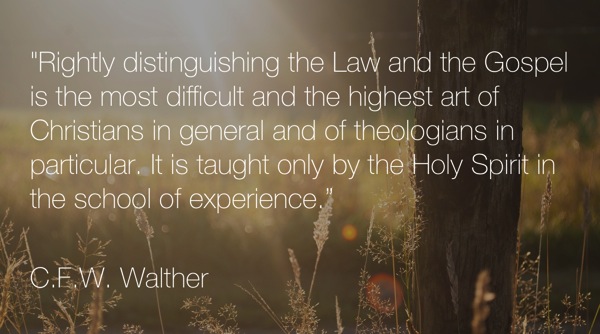My son is almost three years old, which means he is now at the age where I can give him a rule and with evil in his eyes and a grin on his face, he will happily ignore my rules. Since he’s just a toddler, he’s not very good at being naughty and it’s usually more entertaining than frustrating.
Viewing entries in
Preaching
 There are a variety of ways that people talk about and describe preaching, especially when it comes to the purpose and design of a sermon. Some people argue for a strict exegetical style of preaching, others argue for a more topical approach to preaching.
There are a variety of ways that people talk about and describe preaching, especially when it comes to the purpose and design of a sermon. Some people argue for a strict exegetical style of preaching, others argue for a more topical approach to preaching.
One such approach has commonly been described as expositional preaching, which Mark Dever defined as:
"An expositional sermon takes the main point of a passage of Scripture, makes it the main point of the sermon, and applies it to life today.” - 9Marks
While not necessarily in disagreement with that definition, in a conversation with Tullian Tchividjian, Tullian suggested an expanded definition for expositional preaching.
Exposing the sin. And exposing the savior.
“What I’ve come to understand expository preaching to be now: in and through every text of Scripture we expose the sinner by preaching the Law and we expose the Savior by preaching the Gospel.” - Tullian Tchividjian
A New Definition for Expository Preaching
Exposing the sin.
The law exposes us for who we really are. The law makes sure we are completely aware of our failure to be righteous before God. It instructs in holiness and also reminds that we aren’t holy. The law shatters any inflated views of ourself we might have had and brings us back down to earth.
The law reveals that we are a mess and in need of a Savior. The law does its work so that the Gospel might do its work. The law kills us in order that we might be made alive.
Exposing the Savior.
The Gospel is the message of rescue. It exposes Christ who made us righteous even though we are sinners. The Gospel is the message that proclaims forgiveness that is not based on what we have done, but is based on the finished work of Jesus. The Gospel calls sinners “saints.”
The Gospel acknowledges that we are a mess. But it makes known the work of our Savior. The Gospel does its work redeeming and rescuing our broken lives. The Gospel brings us, while we were dead in our sins, back to life.
“Virtually the whole of the scriptures and the understanding of the whole of theology–the entire Christian life, even–depends upon the true understanding of the law and the gospel.” – Martin Luther
 If you listen to the radio for a while, you’ll probably notice that every song kind of sounds the same. Or if you watch movies, you’ll often start to notice how frequently movies are just re-makes of something else. And even the original movies still all use the same basic story structures, such as the Hero’s Journey. The same thing happens with technology. Microsoft makes something. Google makes their version. And Apple comes along and makes there version a little bit better than the others.
If you listen to the radio for a while, you’ll probably notice that every song kind of sounds the same. Or if you watch movies, you’ll often start to notice how frequently movies are just re-makes of something else. And even the original movies still all use the same basic story structures, such as the Hero’s Journey. The same thing happens with technology. Microsoft makes something. Google makes their version. And Apple comes along and makes there version a little bit better than the others.
[tentblogger-youtube oOlDewpCfZQ] Everybody is copying.
Solomon said it himself when he wrote, “There is nothing new under the sun.” Whether we are talking about music, books, a sermon series, or blog posts, there really aren’t any completely original ideas. All of our ideas come from someone else who got their idea from someone else who got their idea from someone else.
We all desire innovation, but we often forget that the innovators are also copycats.
Copying is usually frowned upon, but I think that as artist-theologians many of us would benefit from learning to copy well. When we learn to copy appropriately, we learn from the positives of the artists around us and make that our own. We don’t become carbon-copies of the people we copy but we become hybrids of all the people we imitate and when combined with our own personality and style, it becomes something completely new.
Listen.
Find other artists, preachers, storytellers, and writers. Read their writing. Study how they say what they say. When you find one that you love, listen to everything and find out what they read and listen to.
Imitate.
It’s okay to copy bits and pieces of the people you love. Copy what you love while still being yourself. Years ago, I was overly concerned with sounding like the preachers I liked, but it was recommended to me that I shouldn’t worry about it.
Why?
Because that preacher I loved, he sounds like the preachers he listened to. And his preachers sound like their preachers. And so they were all shaped by the ones who went before them and help form the preacher himself.
Make it your own.
The goal in copying isn’t to be identical to any one artist, but to learn the skills and apply those to yourself.
Austin Kleon suggests, "“Start copying what you love. Copy copy copy copy. At the end of the copy you will find your self.” Copy the preachers, writers, and artists you love. And in the end you may be influenced by those artists, but you will still be you.
You copy some. You discard others. And you learn your own voice.
 As preachers in the twenty-first century, we are given the task of the missionary translating the ancient message of the Scriptures into the language of a pluralistic, post-Christian, post-everything culture. This is an important and difficult calling.
As preachers in the twenty-first century, we are given the task of the missionary translating the ancient message of the Scriptures into the language of a pluralistic, post-Christian, post-everything culture. This is an important and difficult calling.
But often we do the opposite. We speak the same foreign language we have been and expect outsiders to adapt instead of walking out the back door.
"We have made the gospel foreign to other cultures by asking people to convert to our culture to become Christians." - Paul Hiebert
The preacher is called to preach the unchanging truth in new and different ways as he speaks to the people he is trying to reach. And he doesn’t that simply in the words he uses, in realizing who he preaches to, and in connecting that message to Monday morning.
Avoid using words they can’t understand.
Martin Luther said that when he preached he aimed at the youth in the church, not the highly educated. He wasn’t interested in impressing the adults with his extensive biblical knowledge and understanding of Greek and Hebrew. He wanted them to hear a clear and simple message of grace.
When we translate ancient truths into everyday language we have to become craftsman with our words. We carefully choose words that will connect with the hearer to ancient message in words that they understand.
Preach doctrine to people.
There’s this crazy idea that occasionally floats around that doctrine doesn’t matter. That’s ridiculous. But I bet there’s a reason that people come to that conclusion. Because the people that seem to care the most about the doctrinal debates aren’t normal people.
Doctrine matters but we preach to normal people. And normal people aren’t interested in who is right and who is wrong, they are interested what it means for them.
Charles Spurgeon once said that we are called to feed God’s sheep, not his giraffes. There is no way to preach the Bible without preaching doctrine. It would be silly to preach the Bible and ignore any distinctions that are unique to your particular denomination; embrace those fully and give it to people in a way they can understand.
Connect to Monday.
Preaching isn’t solely about what happens on Sunday morning. It is about what happens on Sunday - God’s work for us as we hear from his word. But it is also about Monday morning.
Preaching should be for ordinary people in a language they can understand with a theology that matters for the life they live.
As churchgoers, we love to show up to church on a Sunday morning and leave behind everything we heard once its lunchtime. But if we really want our people hearing the message and embracing it, we should be preaching a message with hopes that it follows them home.
The message should follow them home into their daily dying to sin and being reminded of forgiveness. And the message should follow them home as it calls them to fulfill their vocations. When we think that the sermon is just about what happens when we gather at church, we ignore the people we preach to and their calling to be the church in their homes, communities, and workplaces.
There are a lot of bad sermons. And since I’m a professional sermon-giver, I tend to think of myself as a connoisseur of good preaching. And in my listening to sermons, there are plenty of preachers who just come up with garbage. There are dull and boring preachers that at least still preach the truth. And even worse, there are engaging and creative preachers that boldly preach things that are not biblical and hardly helpful.
Harmful preaching can be hard to detect behind a veil of clever phrases and enthusiastic shouting. And it’s not because the listeners are unintelligent, but simply because harmful preaching often disguising itself in spiritual language.
The worst kind of 3 point sermon was, “Here’s what you should do. You are not doing it. Try harder.”
1. Here's what you should do.
This is great. The scriptures clearly proclaim to us the will of God and how we should live our lives. They speak to what we should do as Christians and they speak to what all people do as they go about their lives. To say that we shouldn’t ever talk about what we should do is equally dangerous as the problem that only talks about what we should do.
2. You are not doing it.
Again, the sermon has not yet taken people down a road to hell paved with an excellent spiritual life and a lack of cursing, drinking, or gambling . This point is spot on. If you tell people what they should be doing, quickly following that will be a reminder that they are not doing it.
And a lot of preachers can’t even get this point right.
If you preach, “Be perfect as your heavenly father is perfect.” The only response must be, we don’t do it. But often preachers will preach what we should be doing and fail to ever point out our failure to do so.
Good preaching does not ignore the reality that God’s word is often a mirror that we can hold up to our own lives and see every blemish and crack. The Bible is clear about what you should be doing. And it is clear that you are not doing it.
3. Try harder.
The worst kind of sermons make the first two points and move on to this third one. If you preach well and make clear what the scriptures call all people to do, people will fully realize that they are not doing it. And if you when that happens, they will be broken by their sin.
And that’s not bad. That’s just God doing what he wants to do in order that the Gospel might do its work. The problem is that when we the third point is about trying harder instead of Christ, we leave people broken and drowning in their sin only to throw them an instruction manual on building a better boat.
The response to the broken and condemned person is not “try harder” but “It is finished.” Too many of our sermons ignore the message that forgiveness was won on the cross of Jesus and disguise it by claiming it to be about a Christian’s “spiritual life.”
The problem is without preaching “It is finished” no motivation or inspiration is going to change the person hearing the message. Try harder doesn’t ever produce what it demands. Only the Gospel produces the change that the law demands. Only the Gospel changes the me-centered hearts that are continually prone to wander and rebel against everything that God has said.
 In a recent interview with Tullian Tchividjian, he recommended that young pastors learn to “Comprehend high and communicate low.” For pastors and theologians that give their live to studying a library of complicated theological works, this can be difficult.
In a recent interview with Tullian Tchividjian, he recommended that young pastors learn to “Comprehend high and communicate low.” For pastors and theologians that give their live to studying a library of complicated theological works, this can be difficult.
We’ve all experienced at some point or another being in a conversation with somebody that knows so much about something that it seems like they are talking in a foreign language.
It happens when pre-teens start talking about Minecraft. A bunch of pre-teens gather around talking about their servers, texture packs, briefing, or something else that I really don’t understand.
Meanwhile you are standing there like, “So you build stuff?"
This happens to me whenever I get my car fixed. The professionals know so much about cars that an ordinary person like myself cannot understand anything beyond “It is going to cost $500 because it is broke.”
As preachers, we eat, sleep, and breathe theological works. We love to read books by guys who are dead and wrote brilliantly hundreds of years ago. We love to listen to other preachers and understand how they proclaim the Word and find out what books they are reading and who they are learning from.
But the people we preach to aren’t in the same boat. I’m not preaching to seminarians or professors. I’m not preaching to theological connoisseurs who treat their preachers like tasting a fine-wine; I’m preaching to ordinary people who are looking for a sermon in a language that they can understand with a theology that matters for the life they live.
Martin Luther said it this way:
“To preach plain and simple is a great art: Christ himself talks of tilling ground, of mustard seed, etc; he uses altogether homely and similitudes. Cursed are all preachers that in the church aim at high and hard things, and neglecting the saving health of the poor unlearned people, seek their own honor and praise…When I preach, I sink myself deep down. I regard neither Doctors or Magistrates, of whom, are here in this church above forty; but I have my eye to the multitude of young people, children, and servants, of whome are more than 2000. I preach to those.” - Martin Luther
I pray that the more I learn and study theology, the harder I work to translate the truth of God’s word into the language of the people I serve. In the words of JI Packer, my hope is that I would learn to “Feed sheep, not giraffes."
 As a preacher, one of the most valuable tools that I find in preaching, is preaching without notes. The idea of preaching without notes is one that I’ve loved whenever I’ve seen it done. But the idea of doing it is quite frightening. It is extremely nerve-wrecking to consider standing in front of a congregation without your trusty notes to guide you through.
As a preacher, one of the most valuable tools that I find in preaching, is preaching without notes. The idea of preaching without notes is one that I’ve loved whenever I’ve seen it done. But the idea of doing it is quite frightening. It is extremely nerve-wrecking to consider standing in front of a congregation without your trusty notes to guide you through.
As I’ve begun preaching regularly for our entire congregation, I’ve tried to make it a regular practice do preach without notes.
Why?
If I can’t remember what I’m talking about, how will the congregation be able to remember what I said? Years ago, I listened to a preacher talking about communication and he suggested that giving a sermon should be like talking about your own family. What he was suggesting is that a sermon should be something that is so deep within you that it doesn’t feel like your reading from a script or a page of notes.
Some Tricks to Help You Preach without Notes:
1. Practice, practice, practice.
One of the best ways to diminish the need for notes is by practicing. When I preach, I practice a ton of times, each time reducing the amount of notes that I use when practicing. When I start practicing on Tuesday, I might be at about 6 or 7 pages of notes. Each day this gets significantly reduced so that finally by the end of the week I hardly need 1 page of notes.
Now, I get it, some people suggest that they really don’t like to practice. But nobody likes to practice.
But it helps. And while it might seem unnatural to practice your sermon out-loud, it will probably make it much more natural when you actually deliver the sermon.
2. You can still use notes.
One of the tricks I learned about preaching without notes is that I can still have notes. I just keep them hidden and have them to fall back on if necessary. Because of the practice I really don’t need the notes much, but I do have them and can strategically use them when we open up and read the Bible.
Throughout the week when I am practicing my sermon, I also use that time to get my notes down to a single sheet of paper. I end up making that paper into two columns so that I can have a single sheet of notes that can be laminated and fit within the pages of my Bible while I’m preaching.
I use the notes as a bookmark and will occasionally reference it if need be.
Download a copy of notes I've used in a sermon.
3. Think in chunks.
As I reduce my notes, what I’ve learned is I have to think in chunks for my sermon. This means I have an idea for what I want to communicate but I also need to have a way to reference that idea enough in my notes so that its short. A friend of mine suggested that one way of looking at these chunks would be like doors to a room. Think of your sermon as a house that you want to explore. The chunks are simply the doors into the rooms. You need the doors to help you remember where you are going, but once you have the door you then can open it up and start showing people around.
 Have you ever experienced a film that is so good that you hated when it was over? You know the kind of movie I am talking about - the movies that have you so engaged and when all of the sudden the music starts to crescendo and the credits start rolling, you immediately have a panic attack and shout, “NO!”
Have you ever experienced a film that is so good that you hated when it was over? You know the kind of movie I am talking about - the movies that have you so engaged and when all of the sudden the music starts to crescendo and the credits start rolling, you immediately have a panic attack and shout, “NO!”
Because the movie can’t end like that. We never found out if they end up together. Did they live? Who did they choose?
In a good film, a good storyteller has this incredible ability to share key elements of a story and also to hold back other key elements. This is what makes these films so engaging, we see what we need to and at other times we are left with unresolved tension.
Jesus does this same thing in his ministry.
A rich, young man asks Jesus a seemingly simple theological question when he says, “Teacher, what must I do to inherit eternal life?”
Jesus responds, “You know the commandments: Don’t murder, don’t commit adultery, don’t steal…”
The young man believes that he has kept the commandments since he was a young boy. And at that Jesus responds, “Go, sell everything you have and give to the poor, and you will have treasure in heaven.”
And the rich, young man walks away.
That’s the end of the dialogue. Jesus doesn’t go chasing after him to clarify that he really could inherit eternal life without giving up his possessions. The scriptures never tell us that this man would later come back after realizing that Jesus was what he really needed. It just ends abruptly. Jesus says, “Give all your stuff away.” And so the man leaves.
End of story.
In preaching, we have a task that makes these same kind of choices. What words do we share? What story do we tell? When do we share words that condemn and kill? And when do we speak words that offer grace and bring life? If the Bible is a book of two words: law and gospel. The great art for the preacher is distinguishing law and Gospel.
There is a time for our words, as preachers, to kill. This is the job of the law. The law convicts sinners. It terrifies the sinner and drives the hearer to their knees. This is what Jesus shares with the rich, young man. The young man is clearly a bit arrogant in his ability to obey the law, so he needs to hear a word that brings him back to reality. And because of how the man responds, Jesus makes the difficult decision to not share the rest of the story. He holds back. And rightly so, because the unrepentant, young man doesn’t need to hear Gospel in that moment.
The disciples on the other hand respond much differently to Jesus’ conversation with the young man.
Jesus' preaching of law leads the disciples to ask the question, “Well, who then can be saved?” This is the point. The law did its work for the disciples. The law convicted them. Because of how Jesus told the story, they clearly realized that they can’t do it. That’s the point that the rich, young man never realized.
And so the disciples need a different word.
The disciples don’t need a word that condemns. They don’t need a word that brings more rules and laws to keep. They don’t need seven steps to living a life of discipleship. They need the Gospel. They need the word that brings life. When the law drives the sinner to repentance, the Gospel comes in and speaks words of forgiveness. When the disciples ask, “Who then can be saved?” The Gospel comes in and says, “On your own, no one. But through Jesus, even you can."

So when do we speak these words? When do we speak words that condemn and when do we speak words that forgive? If we preach grace to the unrepentant sinner, we simply embolden the sinner. And if we preach condemnation to the broken, repentant sinner, we kill the sinner who is looking for that which would give life.
This is the difficult task of anyone who speaks the words of the scripture to another.
Whether that be when parents speak to their children, when preachers share a message, or when a friend has a conversation. Distinguishing law and gospel is an art. It takes an artist to determine when to stop and when to keep pushing. It requires art to know how to build the tension and when to release that tension. And it takes art to discern, what words does this person need to hear right now?
"Rightly distinguishing the Law and the Gospel is the most difficult and the highest art of Christians in general and of theologians in particular. It is taught only by the Holy Spirit in the school of experience.” - C.F.W. Walther
Matt Chandler is one of the best communicators of the Gospel and if I could ever sit down with someone and talk preaching, he would be at the top of my list.
 God. Religion. Consumerism. Confession. Sin. Truth. Marriage. Money. If these were the words of a preacher, it would be no surprise. Ben Haggerty, commonly known as Macklemore, has made fame rapping, or should I say preaching, about topics which often are undiscussed in the genre of hip-hop. He writes words like, "The greatest trick that the devil ever pulled was convincing women that they looked better in makeup" and, "When I was at church they taught me something else, if you preach hate at the service those words aren't anointed."
God. Religion. Consumerism. Confession. Sin. Truth. Marriage. Money. If these were the words of a preacher, it would be no surprise. Ben Haggerty, commonly known as Macklemore, has made fame rapping, or should I say preaching, about topics which often are undiscussed in the genre of hip-hop. He writes words like, "The greatest trick that the devil ever pulled was convincing women that they looked better in makeup" and, "When I was at church they taught me something else, if you preach hate at the service those words aren't anointed."
Macklemore is a preacher. He may not have the same agenda, the same source of truth, or even the same beliefs. But he is a preacher. He has set out to proclaim a message; he has set out to inspire people and start a movement. He wants to change culture. And I think preachers could learn a few things from the way he approaches his art.
1. People want to talk about spiritual things.
For Macklemore, spiritual topics are not off limits. He has no problem getting into spiritual discussions in interviews or in the lyrics of his songs; whether to proclaim what's wrong with religion or to point out what's wrong with society, spirituality is a frequent component of his music. People want to talk about the things that matter. Macklemore's album calls out the problems with commercialism and the dangers of money, he preaches about his beliefs about gay marriage, and he talks about his confession habits as he goes to the bar. These are all topics that preachers talk about…and people want to talk about it.
2. Put yourself in the seat of the listener.
"I put myself in the place of the listener when editing my writing. The last thing that I want to do is be preached at and told who to be or what to think when listening to an artist. However, I do want to be inspired. There's a fine line." - Macklemore from Interview Magazine
When Paul preaches the Gospel he understands the people that he is preaching to. The content of the message doesn't change, but the context of the message does. When he preaches to the Jews, he preaches in a way that resonates with a Jew. When he is preaching to a group of spiritual people who aren't familiar with the Hebrew scriptures, he quotes pagan prophets and poets to share the Gospel. In order to preach the scriptures faithfully, we must be committed to both the content of the Word and the context of the people.
[tentblogger-youtube gAg3uMlNyHA]
*note: this video may have some explicit lyrics
3. Inspire people to something better.
In the song Wing$, Mackelmore boldly calls people to leave their lives of consumerism:
"It started out with what I wear to school That first day, like these are what make you cool And this pair, this would be my parachute So much more than just a pair of shoes Nah, this is what I am What I wore, this is the source of my youth This dream that they sold to you For a hundred dollars and some change Consumption is in the veins And now I see it's just another pair of shoes"
Macklemore preaches by pointing us to the reality of what consumerism does and tries to inspire us to live differently. This is not all that different than what happens on a Sunday morning - just what we do on Sundays tends to not be nearly as artistic or memorable. Macklemore points people to the reality of consumerism or whatever other issue he is rapping about. Preaching points people to the reality of their sin and the consequences of it (which could even be the sin of consumerism). Macklemore tries to inspire people to live differently. Preaching proclaims the Gospel, which sets people free and in turn inspires people to live differently.
What lessons have you learned about preaching recently?
 Erik Wahl recently was a keynote presenter at Western Michigan's Food Marketing Conference. I had absolutely no interest in the food marketing conference itself, but having become a recent fan of Erik's artwork and speaking, I found a way to attend his keynote and finally get a chance to see him perform live. The primary reason that I have been so interested with Erik Wahl is that he is an excellent communicator. And as a preacher who loves the art of preaching, there is a value in seeing an artist showcase his craft and try to learn a few tricks.
Erik Wahl recently was a keynote presenter at Western Michigan's Food Marketing Conference. I had absolutely no interest in the food marketing conference itself, but having become a recent fan of Erik's artwork and speaking, I found a way to attend his keynote and finally get a chance to see him perform live. The primary reason that I have been so interested with Erik Wahl is that he is an excellent communicator. And as a preacher who loves the art of preaching, there is a value in seeing an artist showcase his craft and try to learn a few tricks.
If you haven't seen any of Erik's work, you can find a video later in the post of one of his pieces.
3 Lessons on Preaching from Erik Wahl
1. You are an artist.
If you ask a room full of adults, "How many of you draw?," you will not likely get very many hands. The same would probably be true of preachers. If you asked a Kindergarten classroom this same question though, the results would be completely different. Something happens as we grow older, and we begin to believe we aren't artists. We believe we aren't creative. We've been told that certain things have to be done a certain way in order to get the results that you are expected to get. When it comes to preaching, I love looking at the sermon as a work of art. When I work on my sermon I want to actually believe that I'm creating a work of art that makes a difference.
[tentblogger-vimeo 35737101]
2. Timing is important.
When Erik was painting one of his pictures, he perfectly timed his painting so that as the music finished, he would spray paint an apple on the canvas, ask us to "think different" and rotate the canvas in order to reveal that the painting was Steve Jobs. When I preach, I spend a lot of time working on the content of my message and even specifically crafting the order of my content, but an area where I can improve in understanding the significance of the timing in how I say certain things. The rhythm, the pacing, the tone, and pauses all help communicate. And those are things that are easy to forget about and can only really be perfected by practicing.
3. Your talk doesn't end when you end.
As Erik neared the end of his keynote, he described the significance of social media and it's implications for all the people in the food industry. As he described the significance of social media, he also let the entire room know his plans of doing an "art drop" by giving a clue via Facebook at 10:01pm. The art drop is brilliant in and of itself, but engaging the audience by encouraging them to participate in this art drop was even more brilliant. This social media illustration would be experienced by the audience even after the keynote was finished and participants had left the building. What would our sermons look like if they didn't end when we prayed? What if our sermons engaged people still on Monday?
Who is someone that is not in ministry that you've learned some lessons about ministry from?
The primary role of the preacher is to take their lives, the scriptures, and other people's works and curate them into the sermon.
From the moment you enter the world as a tiny baby and until you take your last breath, things will be constantly changing. While change is common, it is often difficult.
Have you ever experienced something so delicious that you had to eat more? Maybe you've opened a bag of Doritos and minutes later discovered that you've eaten almost the whole bag. Or maybe you've experienced the feeling of walking into a kitchen with fresh baked brownies; the aroma fills the room and you can't help but eat several. One of the best snacks that I've ever experienced is my mom's chocolate chip cookies. My mom makes the best chocolate cookies in the world. There is nothing better than a tall glass of milk and a chocolate chip cookie that has been warmed up in the microwave.
This series focused on the importance of both knowing the truth of the gospel and daring to live it out in our daily lives. While the game truth or dare allows us to choose one or the other, our faith requires us to choose both. When I think of what it would like like to live a life, that solely focused on the truth of the gospel, but never dared to live it out, I can’t wrap my mind around how that can be justified.


